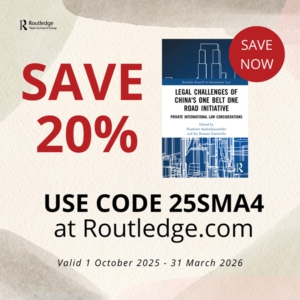The Double Face of Private International Law: Reconsidering Its Colonial Entanglements
Originally posted here
Current Research in Private International Law at the Max Planck Institute for Comparative and International Private Law, Hamburg
- Date: Dec 5, 2025
- Time: 11:00 AM (Local Time Germany)
- Location: online
About the speaker
Béligh Elbalti is a Professor at the Graduate School of Law and Politics, Osaka University. He is the author of numerous academic publications, primarily in the field of private international law, including blog posts on conflictoflaws.net. His research focuses on the development of private international law at both the national and international levels, with particular emphasis on Asia, Africa, and the Middle East.
About the Topic
In its general discourse, private international law (conflict of laws) is often presented as a discipline grounded in principles such as sovereignty, the equality of states, and comity. Its defining traits are said to flow from this premise of equality between legal orders, including its claim to neutrality, its pursuit of international harmony in cross-border cases, and its role in coordinating diverse legal systems. However, it is striking that private international law developed in an international context marked by domination, inequality, and subordination, a context that challenged the very premises on which the discipline claimed to rest.
Within this broader context, private international law appears to have played a dual role. On the one hand, it served as an instrument of colonial domination, particularly by denying its foundational premises to legal systems not regarded as “civilized”. In these contexts, instead of applying the ordinary methods of private international law, alternative mechanisms were employed to manage foreignness, most notably through systems of extraterritoriality – whether in the form of consular jurisdiction, mixed courts, or foreign courts operating in colonized or semi-colonized territories. On the other hand, private international law also functioned as an instrument for restoring sovereignty and achieving independence. The abolition and dismantling of extraterritorial regimes required colonized and semi-colonized states to meet the substantive and institutional conditions considered necessary for recognition as a “civilized nation”. This included, among other reforms, the establishment of a functioning system of private international law, alongside the adoption of substantive and procedural legal frameworks that guaranteed equal rights and protection for foreigners.
About the Virtual Workshop Series
The virtual workshop series “Current Research in Private International Law” is organised by Ralf Michaels and Philomena Hindermann. The series features guest speakers and Institute staff members who present and discuss their work on current developments and research topics in private international law. The workshops are geared to scholars who are researching in the field of private international law, but attendance is open to all individuals having an academic interest (including doctoral candidates and students).
The virtual lecture will be held as a video conference via Zoom. Please register no later than Thursday, 4 December 2025 using this LINK.
You will receive the login details on Thursday afternoon. If you do not receive an email containing the login data, please check your spam folder as well.



 A new book Legal Challenges of China’s One Belt One Road Initative: Private International Law Considerations edited by Dr Poomintr Sooksripaisarnkit and Dr Sai Ramani Garimella has now been released by Routledge.
A new book Legal Challenges of China’s One Belt One Road Initative: Private International Law Considerations edited by Dr Poomintr Sooksripaisarnkit and Dr Sai Ramani Garimella has now been released by Routledge.
